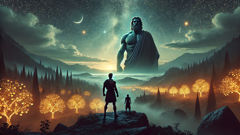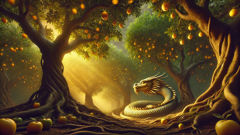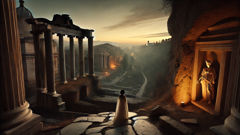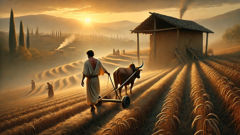Introduction
The sea around the farthest thinking of men had a different hush to it in the days when gods rubbed shoulders with mortals. It was not silence so much as a waiting: the skin of water held its breath, and the horizon kept its counsel. To reach the garden of the Hesperides was to cross that hush into a place where even time tilted; branches stored the light of other suns and leaves carried the memory of days uncounted. Heracles stood on that fringe of the world with footsteps that had already pressed into two dozen tales. His shoulders still bore the faint ache of labors already performed; his heart bore the memory of home, of losses that had pushed his muscles to muscle with fate. He had come for one more thing: golden apples that glowed with a promise older than kings. The apples were not mere fruit but a curious signal from the cosmos—tokens grown under the guardianship of gods who keep careful accounts. They hung where summer refused to leave and winter dared not enter, a cluster of impossible light woven into a garden of perpetual dusk. Around that orchard coilings of legend and danger had turned to routine: a dragon named Ladon curled over trunks and roots, scaled in enamel and bronze, his many heads like the tide; nymphs moved through shadow with eyes that might be kind or sharp as flint depending on how a question was asked of them. Atlas, who once unleashed the heavens upon his shoulders and learned the geometry of endurance, knew both the angle of the stars and how to bargain. The island itself was a language of stone and wind—mountains that listened, valleys that gave away answers grudgingly, and salt-struck cliffs that dropped like severed thoughts into the sea. For Heracles, the path was twofold: to take apples that belonged to immortals and to do so in a way that would not invite the day's wrath upon those he loved. He did not believe only in strength; he believed in complicity with cunning, in the fine balance between muscle and mind. This story follows the creak of his sandals, the hush of the garden's leaves, and the negotiation between a man who had carried the world on his arms and a destiny that expected nothing less than an ending worthy of song.
Crossing the Sea and the Weight of Promises
Heracles' first steps toward the Hesperides were not hurried. He learned early in his years that haste had a way of gifting upstarts to fate. The sea he crossed had the luster of old mirrors and the temper of a test. Fishermen on the nearest mainland told of currents that turned the bravest homeward or left them to a slow forgetting, and sailors tended their oaths before setting sail, moving from speech to silence as if changing a cloak. Heracles took none of their barges. Instead, he found a boat at anchor—a keel patched by hands that trusted in gods and salt—and paid with a nod to a man who claimed descent from river-spirits. The boat from then on felt like a confidant: its oars kept a steady rhythm that matched Heracles' breathing. He used that rhythm to count his memories. He counted the names of those he loved and those he had lost, the faces of kin and the shadows of foes. Memory, like muscle, can be trained. You teach it to lift grief without breaking.

The island that housed the garden was not marked on charts the way a trader expects ports to be; it occupied a geometry poets called strange and cartographers avoided. When the cliffs rose ahead, Heracles found the land unpopulated by voices but crowded with presences. Statues half-swallowed by moss, the hum of stones warmed by unseen currents, and the scent of fruit that seemed to belong to both earth and sky—these were the first things he met. There was also a warning: carved deep into a rock face was an inscription older than any king’s dynasty, letters often unreadable to mortal eyes but clear enough to his sense. It spoke not in commands but in consequence: take without knowledge and you will belong to what you take from. Heracles understood consequence; he had learned it by force against enemies and by loss at home. He stepped through the thorned fringe of the orchard like a man aware that every footfall becomes a line in a story told about you after you are gone.
In the grove, trees bore fruit with a light like folded sun. The apples were golden in color and heavier in significance; they shimmered with a hint of motion even when wind did not stir. It was not simply their color that made them strange but the manner in which they gathered light, holding and returning it as if they had their own small day within them. Around them moved the Hesperides—nymphs who tended to the garden with an economy of movement and a patience not common to mortal caretakers. They were neither hostile nor coy; they were observers who had learned to measure the soul by what it wished to carry away. Heracles did not approach them with mockery or deference; he addressed them with a directness that had made him both friend and foe to many. He asked questions that required listening, and their answers were often half-sung, half-spoken. They did not promise to help, but they did not prevent his pursuit; in their manner there was a test—how would a man confront what is kept from him by beauty and fear?
The guardian of the fruit was less a beast than an institution: Ladon, a dragon with scales that recorded light in tiny, prismatic histories. Told in some quarters that he had as many heads as there were seasons, in others that he had one and the world did not count heads but the fierceness that attention could generate. Ladon was not quick to anger but he could be inexorable. His eyes read more than movement; they read intent. Heracles felt that gaze as one feels the pull of a tide. The dragon's coils braided themselves through roots and rock, an unreadable pattern on the ground. One did not simply beat Ladon in single combat with brawn. One had to coax or out-think the guardian, to find a place where a promise could be made and kept. That is how bargains begin: not with the overthrow but with the alignment of interests. The question in Heracles' case was whether an alignment could be struck between a mortal hunger to complete his task and a divine stewardship that preferred to be untouched.
There came a turning point under an hourglass sky, where dusk spread like a veil and stars were still collecting their courage to shine. Atlas, the titan who once carried the heavens, arrived as if the mountain itself had spoken. He walked with slow certainty, his shoulders a map of learned strain. Their meeting was not a mere collision of muscle and muscle but of histories. Atlas had reason to know where the garden lay and how the apples could be taken. He also bore his own grievance with the order of things: punishment, endurance, and the peculiar loneliness of one who bears weight. Heracles listened; both men knew the vocabulary of burdens. Atlas proposed a trade that would bend the frame of the task itself—take the apples if you can, he said; put them in my hands and I will keep them. But he proposed also different terms: could a man who has already worn the yoke of penance demand more of those who suffer? Bargains with titans are never primarily about benefit; they are about reciprocity balanced on the edge of a blade. Heracles recognized the necessary deception in such offers—but not all deception is dishonorable. Sometimes the fate of many hinges on a private concealment. He asked Atlas to hold the sky for a brief time while he fetched the fruit, and Atlas, who had been skilled in measuring lengths of time by the cost they exacted, tilted toward the offer. This interchange revealed the paradox of Heracles' task: his kind of courage required a negotiation between muscle and mercy, cunning and clarity. The sea beyond the grove held its hush as if listening for the outcome.
When Heracles moved to pluck the apples, he did not do so like a thief in shadow but like a man performing a rite. He considered the bark beneath his fingers, the way the branches bore the golden weight, and the quiet presence of Ladon coiled nearby. He understood that taking would change the orchard as surely as removing a chord changes a song. He lifted fruit with reverence and a sense of duty, and in the doing he paid homage to a system that had kept such light safe for immortals. The apples did not scream as they left their stems; they slid free with a soft, metallic sound, as if a small bell were freed from binding. That sound reverberated through the garden and into the mythic rooms of the world. It was a sound that would be traced in songs and hushed in temples. And yet, even then, the work was unfinished. For the garden is never merely an object to be possessed: it is a geography of relationship, and Heracles had to find the way home without breaking the web that held the orchard’s secret together.
At the edge of the grove, when the sea's hush returned, the world felt altered. Heracles carried fruit that shimmered not only with sunlight but with the weight of promise. He had navigated currents and bargains, and he had walked away with what he came for; yet the story was not simply of possession. It became a tale about balance—a man who had used his hands to lift the world would have to use his hands to learn how to return some of it whole. In returning there would be new reckonings to take on, with Olympus and with men, and with the quiet things that count lives. A hero's labor is not a list to be ticked off but a series of reckonings to be met, one by one, until the measure of a life is known to itself.
Ladon, Law, and a Return that Becomes a Song
The second part of any myth tends to be the account of consequences, and in the case of the golden apples the consequences were as intricate as the net in a fisherman's cast. Heracles did not simply pocket fruit and walk away. Stories that reduce the transaction to theft miss the finer point: there was law within the garden, law governed by gods and enforced by guardians, and there was the deeper, unspoken stewardship between those who keep and those who crave. Ladon, coiled amid roots like a living inscription, watched the hero with the slow, patient attention of something that has outlived many calendars. His scales flickered with the soft remainder of day and the first firmament of night. To engage Ladon directly would be brutal and short-sighted; there are fights worth fighting and fights that are pollution. Heracles knew the difference. He therefore turned to wit where brute force might have only made a hole in his honor.

Instead of facing Ladon in single combat, Heracles chose a path of negotiation and distraction. He invoked stories and names that matter to those who guard. He spoke to Ladon as if sharing the small confidences of a stranger on a long road—names and dates and reasons why the world sometimes must exchange a thing of its own for the balance of many. Creatures bound by duty sometimes listen to the weight of a sentence rather than the point of a spear. Heracles offered not only words but the prospect of repair: if the apples left the orchard, perhaps a promise could be made that their departure would not mean decay but a restoration elsewhere—an exchange that could be seen and honored. This is why myths often read like contracts: they are a way the ancients taught each other how to build obligations that could survive the seasons. Ladon, to everyone’s surprise, uncurled a fraction and allowed the negotiation. The dragon's attention was not a simple appetite; it was a calculus that saw the future remembering the present.
On his way from the grove Heracles met the Hesperides more openly. In stories they are often painted as incidental nymphs, quiet armature around the fruit. In truth their role was complex. They were not simple caretakers but witnesses—sustainers of the orchard, lenses through which immortality kept itself from triviality. Each of them carried memory in a different key: one hummed with the sound of lullabies; another counted out constellations with her fingertips; a third kept the ledger of who came and who left. They spoke to Heracles in the language of tending. He listened and learned how the apples answered to more than hunger: they answered to ritual and song, to the right of passage and the correctness of return. He promised, as men do when their hearts are raw with burden, to treat that right carefully. Promises between mortal and immortal are not lightly afforded; they are curated like heirlooms. And yet, Heracles had an urgency that lived more like proper weather—unalterable and needed. He balanced urgency with respect and emerged carrying fruit within which the light seemed to breathe.
The return route is a part of many myths that is often overlooked: taking is one act, returning is another. Heracles found that the sea had not forgotten the hush, but the hush had adjusted its rhythm to account for his passage. The boat that had borne him forth took him back with an altered face; the oars cut water with a sound that now included the memory of golden chiming. On the passage home he thought of the apple’s light as something partly reserved for Olympus and partly as a gift for the fragile cities of humans. The question that most interested him was how to present the proof of a labor to those who keep scores. To bring a golden apple to Eurystheus was to show the world that the hero could wrest meaning from the impossible. Yet Heracles was not purely a showman; he was someone who had learned the cost of display. He wrapped the apples in a cloth that had been blessed in a simple way: by the quiet imagination of a woman who tended her hearth with a wisdom unmarked by temples. That cloth smelled of hearth-smoke and thyme, ordinary scents that keep ordinary days honest.
Olympus received the apples with the kind of ceremony reserved for gifts that also act as messages. The gods were not merely curious; they were watchers who had made bargains with fate and often had reasons to be jealous. Their eyes searched Heracles for any sign the fruit had been taken without consent. But the apples themselves answered in a manner peculiar to objects that have journeyed: they hummed the memory of the earth and the kindness of the cloth around them. The manner in which the gods accepted them became a small lesson about the way divinity keeps score. A gift that arrives with humility and with evidence of care speaks better than a boast. In the quiet that followed, Heracles understood that a labor concluded does not erase past acts. It layers them. Heroism, he learned, is not a slab to be laid down and left; it is a living palimpsest of choices and debts.
Years later, the tale of the golden apples would circulate in taverns and temples alike, mutating with time like any good story. Poets would make of it a pattern to teach youth about balance; mothers would tell it to children at night to explain why some desires must be weighed against the hardship they cause. The apples, when no longer under mortal eyes, became symbols and not mere fruit. They taught those who sang the story that courage is often a negotiation with the world rather than a unilateral demand. Ladon, atlas, the Hesperides—none were merely props. Each remained as part of the world’s grammar on how to hold something precious. The dragon continued to coil and listen, the nymphs kept their ledger of tending and the titans still heard the pull of the heavens. Heracles' journey had been a lesson that strength and cunning need not be enemies but collaborators in the making of justice. And when the story is told well, it remains that: not a simple brag about a hero’s might, but a careful accounting of what we take and what we give back.
Conclusion
When the tale is set down in the hush of a study or the warm din of a marketplace, what matters less is the neatness of the feat and more the meaning threaded through it. The Golden Apples of the Hesperides are, to the ancients and to those who retell them now, a way of shaping a conversation about what we prize and why. Heracles did more than take fruit; he exercised a peculiar form of morality that balanced appetite and account. His hands, which had once lifted the weight of worlds, learned to cradle something fragile and to make a promise in return. That promise, upheld in small ways, became the sinew that bound man to god and nature to law. There is a reason the garden, the dragon, and the titan persist in stories: they are metaphors for the work required to keep a world from unraveling. To read this story as merely an adventure is to miss the ledger beneath the action. To treat the apples as trophy is to ignore the invisible economy of respect and reciprocity the orchard enforces. Heracles' labor is not a closed account but an open question—a reminder that courage, when joined with care, can reweave a thing of light into a larger fabric. In that reweaving we find instruction for our own small labors: that to take, we must first understand; to receive, we must be ready to repair; and to be remembered, we must have acted in a way that future voices can truthfully bless. Thus the apples remain aloud in song and quiet in hearths, an image of what it means to do the hard, honest work that keeps a community and its stories intact.













